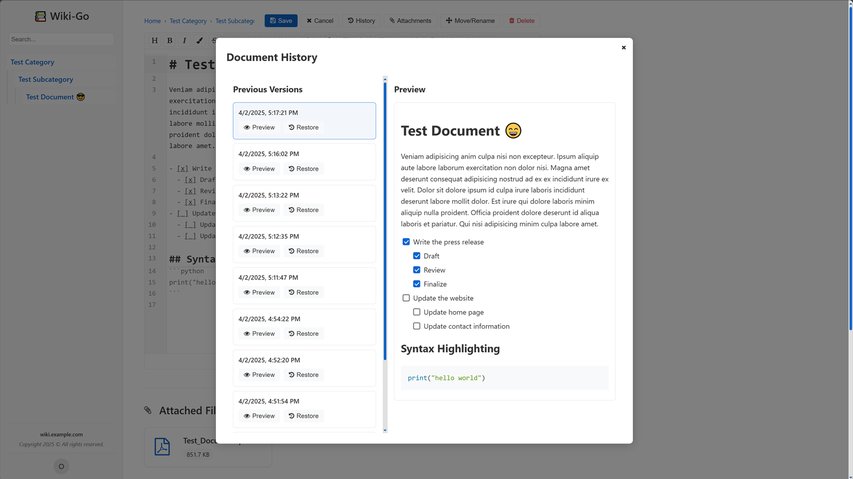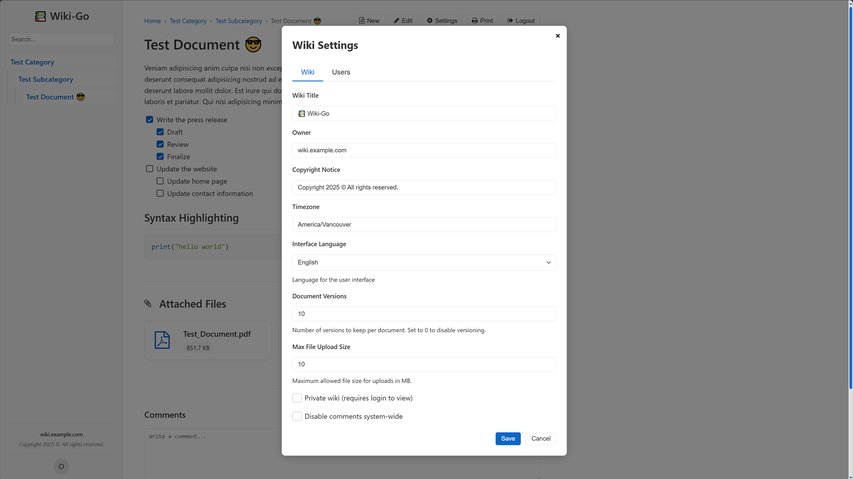Introduction
LeoMoon Wiki-Go is a modern, feature-rich, databaseless flat-file wiki platform built with Go. It provides a clean, intuitive interface for creating and managing knowledge bases, documentation, and collaborative content without requiring any external database.
Features
Features at a Glance
- Full Markdown editing with emoji, Mermaid diagrams, and LaTeX math
- Smart full-text search with highlighting and advanced filters
- Hierarchical page structure with version history
- User management, access control, and private wiki mode
- Comments with moderation and markdown support
- Instant setup via Docker or prebuilt binaries
- Custom logos, banners, shortcodes, and more
Perfect for internal documentation, personal knowledge bases, or team wikis.
Content Management
- Markdown Support: Write content using Markdown syntax for rich formatting
- Emoji Shortcodes: Use emoji shortcodes like
:smile:in your Markdown content - File Attachments: Upload and manage images and documents (supports jpg, jpeg, png, gif, svg, txt, log, csv, zip, pdf, docx, xlsx, pptx, mp4)
- Hierarchical Organization: Organize content in nested directories
- Version History: Track changes with full revision history and restore previous versions
- Document Management: Create, edit, and delete documents with a user-friendly interface
Collaboration & Feedback
- Comments System: Enable discussions on documents with a full-featured commenting system
- Markdown in Comments: Format comments using the same Markdown syntax as in documents
- Comment Moderation: Administrators can delete inappropriate comments
- Disable Comments: Option to disable comments system-wide through the wiki settings
Search & Navigation
- Full-Text Search: Powerful search functionality with support for:
- Exact phrase matching (using quotes)
- Inclusion/exclusion of terms
- Highlighted search results
- Breadcrumb Navigation: Clear path visualization for easy navigation
- Sidebar Navigation: Quick access to document hierarchy
User Experience
- Responsive Design: Works on desktop and mobile devices
- Dark/Light Theme: Toggle between dark and light modes
- Code Syntax Highlighting: Support for multiple programming languages
- Math Rendering: LaTeX math formula support via MathJax
- Diagrams: Mermaid diagram integration for creating flowcharts, sequence diagrams, etc.
Administration
- User Management: Create and manage users with different permission levels
- Admin Panel: Configure wiki settings through a web interface
- Statistics: Track document metrics and site usage
Advanced Features
- Custom Shortcodes: Extend markdown with special shortcodes like
:::stats recenter=5:::for additional functionality - Media Embedding: Embed images, videos, and other media in your documents
- Print Friendly: Optimized printing support for documentation
- API Access: RESTful API for programmatic access to wiki content
Get Started
Docker (quick test)
# Pull the latest image docker pull leomoonstudios/wiki-go # Run with default configuration docker run -d \ --name wiki-go \ -p 8080:8080 \ -v "$(pwd)/data:/wiki/data" \ leomoonstudios/wiki-go
Using Docker Compose (recommended)
services:
wiki-go:
image: leomoonstudios/wiki-go
container_name: wiki-go
user: 1000:1000
ports:
- "8080:8080"
volumes:
- ./data:/wiki/data
environment:
- PUID=1000
- PGID=1000
restart: unless-stopped
Binary
Download the latest release for your platform from the GitHub Releases page.
# Run the application ./wiki-go # or wiki-go.exe on Windows
Build from Source
Requirements:
- Go 1.21 or later
- Git
# Clone the repository git clone https://github.com/leomoon-studios/wiki-go.git cd wiki-go # Build the binary go build -o wiki-go # Run the application ./wiki-go # or wiki-go.exe on Windows
Configuration
Basic Settings
Configuration is stored in data/config.yaml and will be created automatically on first run with default values. You can modify this file to customize your wiki:
server:
host: 0.0.0.0
port: 8080
# When set to true, allows cookies to be sent over non-HTTPS connections.
# WARNING: Only enable this in trusted environments like a homelab
# where HTTPS is not available. This reduces security by allowing
# cookies to be transmitted in plain text.
allow_insecure_cookies: true
wiki:
root_dir: data
documents_dir: documents
title: "? Wiki-Go"
owner: wiki.example.com
notice: Copyright 2025 © All rights reserved.
timezone: America/Vancouver
private: false
disable_comments: false
max_versions: 10
# Maximum file upload size in MB
max_upload_size: 10
# Default language for the wiki interface (en, es, etc.)
language: en
users:
- username: admin
password:
is_admin: true
Custom Favicon
LeoMoon Wiki-Go comes with default favicons, but you can easily replace them with your own:
To use custom favicons, place your files in the
data/static/directory with the following names:favicon.ico- Standard favicon format (used by older browsers)favicon.png- PNG format faviconfavicon.svg- SVG format favicon (recommended for best quality at all sizes)
The application will automatically detect and use your custom favicon files without requiring a restart.
SVG format is recommended for favicons as it scales well to different sizes while maintaining crisp quality.
Custom Logo (Optional)
You can add a custom logo to display in the sidebar above your wiki title:
Create a logo file in one of the supported formats:
logo.svg- SVG format (recommended for best quality)logo.png- PNG format (alternative option)
Place the logo file in the
data/static/directory.The logo will automatically appear in the sidebar above your wiki title.
Notes:
- The logo is displayed at 120x120 pixels, but will maintain its aspect ratio
- SVG format is recommended for the best appearance at all screen sizes
- No configuration changes or application restart needed
- If no logo file is present, only the wiki title will be displayed
- If both logo.svg and logo.png exist, logo.svg will be used
Global Banner (Optional)
You can add a banner image that will appear at the top of all documents:
Create a banner image in one of the supported formats:
banner.png- PNG format (recommended for best quality)banner.jpg- JPG format (alternative option)
Place the banner file in the
data/static/directory.The banner will automatically appear at the top of all document content.
Notes:
- The banner is displayed with responsive width and a maximum height of 250px
- The banner maintains its aspect ratio while fitting different screen sizes
- No configuration changes or application restart needed
- To remove the banner, simply delete the file from the
data/static/directory - If both banner.png and banner.jpg exist, banner.png will be used
User Management
LeoMoon Wiki-Go includes a user management system with different permission levels:
- Admin users: Can create, edit, and delete content, manage users, and change settings
- Regular users: Can view content (when in private mode)
The default admin credentials are:
- Username:
admin - Password:
admin
It's recommended to change these credentials immediately after first login.
Security
- Authentication: User authentication with secure password hashing
- Private Mode: Optional private wiki mode requiring login
- Admin Controls: Separate admin privileges for content management
Technical Details
Built With
- Backend: Go (Golang)
- Frontend: HTML, CSS, JavaScript
- Editor: CodeMirror5 for Markdown editing
- Syntax Highlighting: Prism.js
- Diagrams: Mermaid.js
- Math Rendering: MathJax
Architecture
- Simple Configuration: Easy YAML-based configuration
- File-Based Storage: Documents stored as Markdown files
- Lightweight & Fast: Built for performance
- No External Database: Self-contained with file-based storage
LeoMoon Wiki-Go is designed to be simple to deploy and use while providing powerful features for knowledge management. It's perfect for team documentation, personal knowledge bases, and collaborative projects.




